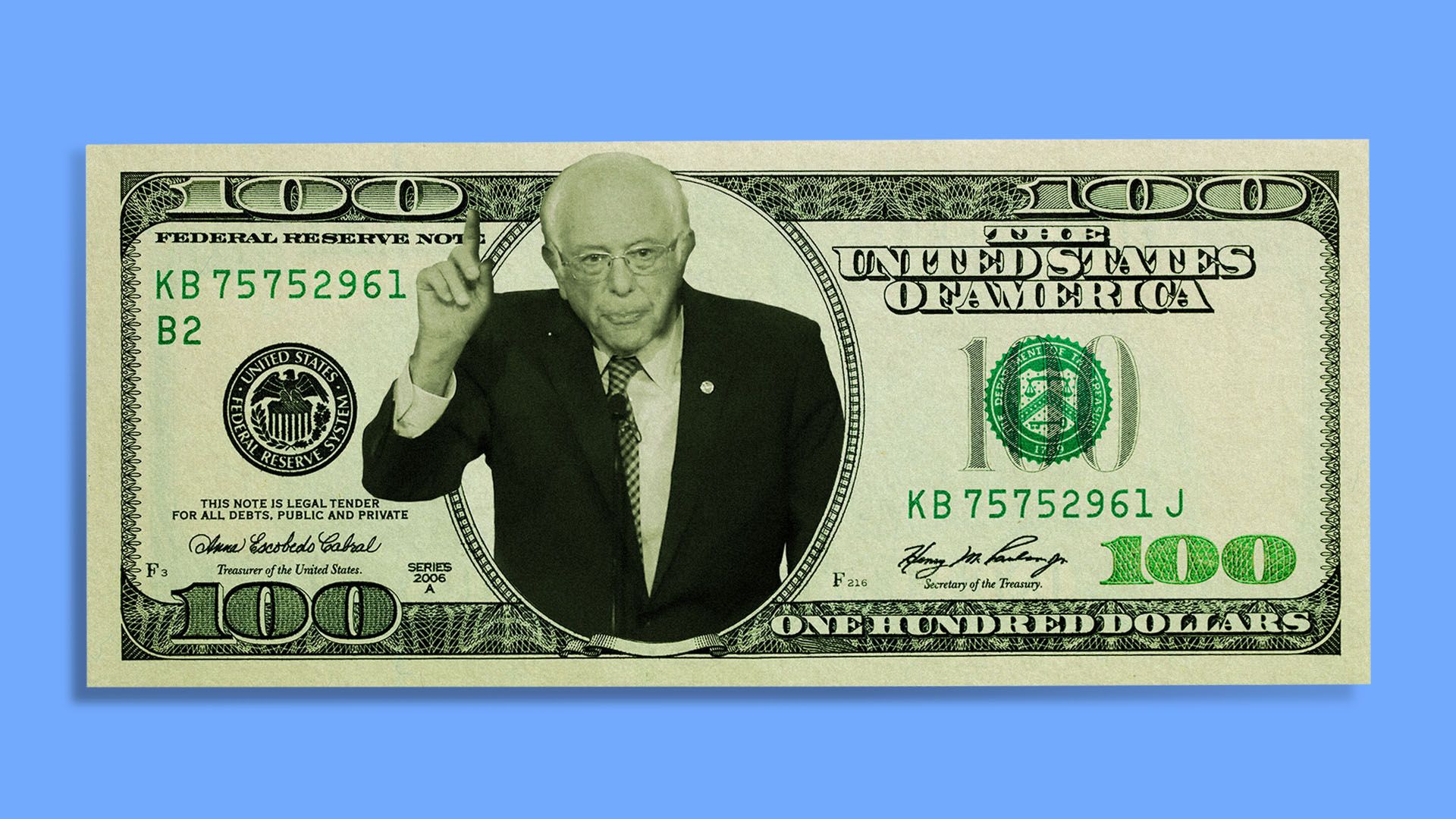
Illustration: Sarah Grillo/Axios
The economy according to Bernie Sanders looks unlike anything any politician this close to the presidency has ever put forth before. It's a rethinking of the entire American economic model.
What it means: To understand the Bernie economy — his plans for free health care, college tuition and a government-guaranteed job for every American — it helps to view it through the lens of modern monetary theory, or MMT.
- While Sanders has not labeled himself an acolyte of MMT, the theory helps explain the unorthodox framework of his economic policy.
The premise is fairly simple: MMT argues that the way we have viewed government policy — that it's like a household with a fixed capacity for earning and spending — is wrong.
- The question is not, "How much will a new program or policy add to the deficit?" but "Can a policy be implemented without significantly raising inflation?"
- If the answer is yes, then whether it adds $50 billion or $50 trillion to the deficit is largely irrelevant because the U.S. government can pay off its debt at any time by printing more dollars and handing those out to its creditors.
The details: "We need to make budgets centered around our real resource capacity and not some arbitrary, imaginary revenue constraint," Stephanie Kelton, an economics professor at Stony Brook University and MMT's most well-known advocate, told Axios recently on the sidelines of the National Association for Business Economics conference in Washington.
State of play: Economists agree that inflation is created by too much money chasing too few goods, which can jolt prices higher and devalue a country's currency. Kelton, an adviser to the Sanders campaign, says that government spending in itself does not manifest inflation.
- She argues that previous outbreaks of hyperinflation — like Germany's after World War I or Zimbabwe's after Robert Mugabe reappropriated the nation's farmlands — were not caused by spending, but by a lack of economic output from that spending.
The intrigue: Critics point out that Sanders' ideas for increasing government revenue — including heavy taxes on the wealthy, raising the corporate tax rate to 35%, and eliminating most corporate tax breaks and loopholes — will fall well short of paying for the new programs he proposes.
- But the tax changes are not intended to offset the spending so much as they are designed to rewire the economy and "spread the wealth," a central tenet of Sanders' democratic socialist philosophy.
Between the lines: While MMT is viewed at best with trepidation and at worst with contempt by most mainstream economists, many of its tentpole findings are in step with those of today's top economic thought leaders.
- The government creation of automatic stabilizers — like the federal jobs guarantee proposed by Sanders (and backed by Kelton) — has been supported by former Fed chair Janet Yellen, former Treasury Secretary Larry Summers and former OECD chief economist Catherine Mann, to name a few.
Yes, but: Kelton says the economy is "resource constrained," so there is some limit on how much policymakers can spend. She just hasn't calculated what that is and puts the onus on Congress to "manage that risk."
- She has evaluated Sanders' plans for student debt forgiveness and the federal jobs guarantee — and surmises that both would create sufficient demand to account for their spending.
- However, she does not want to be "tied to" the accounting for Sanders' proposals like Medicare for All and the Green New Deal, which carry the largest price tags.
The takeaway: There's no telling whether Kelton and Sanders are right, because no government has ever attempted to implement the MMT approach.
- However, the fact that the U.S. national debt has ballooned to $23.4 trillion and both U.S. and global inflation are near their lowest levels on record does support their case.
The bottom line: Bernie Sanders' economic agenda is not merely to "give people free stuff."
- Backed by the fundamentals of an untested economic model (MMT) and socialist redistribution, a Sanders presidency would question and seek to overhaul much of what has underpinned U.S. government policy for generations.
- Whether that is good or bad depends on how much one likes the current state of things.
2020-03-02 10:45:58Z
https://www.axios.com/bernie-sanders-economy-857b5953-337d-477b-b8ea-86ae48b45bd0.html
CAIiEEBiMfEQBdPy7JByO_v8ddAqGQgEKhAIACoHCAowysWECzCkqIEDMM-pgwY
Bagikan Berita Ini














0 Response to "Inside the Bernie Sanders economy - Axios"
Post a Comment